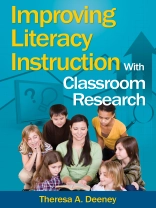‚Filled with reflective questions, keen insights, and helpful resources, this engaging book supports both novice and veteran classroom researchers. At the heart of all of the research is how best to support, engage, and extend learners. As teachers read the clearly delineated steps, they will be energized to confidently engage in their own classroom research.‘
—Cheryl L. Dozier, Assistant Professor
University at Albany, State University of New York
Implement classroom research to develop effective practices in literacy instruction!
Teaching reading skills effectively can be a complex and challenging process for many educators. Theresa A. Deeney provides a detailed primer that illustrates how to create and implement classroom research projects focused on assessing and strengthening literacy instruction.
Improving Literacy With Classroom Research presents a comprehensive overview of the classroom research cycle, which involves noticing a problem, initiating an inquiry, planning for and implementing change, analyzing and reflecting on the results, and developing an action plan. The author includes:
- Guidelines, charts, tables, and information to help educators initiate their own projects
- Recommendations for collecting and analyzing data
- Research about five core areas of reading instruction—phonemic awareness, phonics, fluency, vocabulary, and comprehension
- Examples of authentic teacher research projects focused on literacy skills and instructional practices
This guide shows how to use teacher inquiry and reflection to bring about significant improvements in literacy instruction.
Inhaltsverzeichnis
Preface
About the Author
Part I. Understanding Classroom Research
1. What Is Classroom Research?
2. Cycling Through the Steps
3. Dealing With Data
Part II. Teachers′ Classroom Research in Literacy
Overview
Section 1: Looking at Teaching Within Mandated Programs
Introduction
4. Reading Aloud: Do I Really Sound Like That?
5. Keeping Track of Assessment Data Makes Teaching Easier
6. Differentiating Word Study Instruction
Section 2: Tying Research to Practice
Introduction
7. “Mr. ___ Just Said Rambunctious!”: Learning and Loving Vocabulary
8. Sounding Like Readers: Improving Fluency
9. Word Analysis and Phonemic Awareness Instruction for Older Students
10. Teaching Vocabulary One Part at a Time
11. Ethics and Other Issues in Classroom Research
Appendix A
Appendix B
References
Index
Über den Autor
Theresa A. Deeney is associate professor of reading education and coordinator of the graduate reading program at the University of Rhode Island. After finishing her own teacher preparation in elementary and special education, she began her career as a special education teacher. She then went on to receive an MEd in educational administration, and served as a school principal. Over twenty years, she served as a teacher, principal, reading specialist, and consultant in urban schools in Massachusetts, New Hampshire, and California. Prior to her appointment at the University of Rhode Island, she coordinated a large-scale research project at Boston University and at the Center for Reading and Language Research at Tufts University. She taught graduate courses in reading at Lesley College, Harvard Graduate School of Education, and Boston College. In 1997, she received her Ed D in reading, language, and learning disabilities from the Harvard Graduate School of Education. She currently works closely with teachers on classroom research and inquiry practices that further their own professional development, and has forged school district-university partnerships focused on teacher professional development. In 2007, she received the Outstanding Outreach award from the College of Human Science and Services at the University of Rhode Island for her work with urban teachers. Her research and teaching focus on teacher education and reflective teaching practices, including classroom research.












